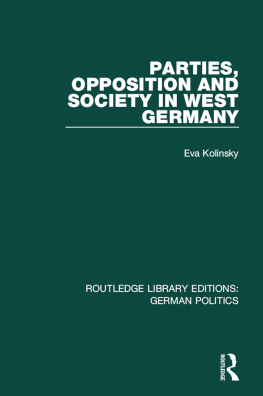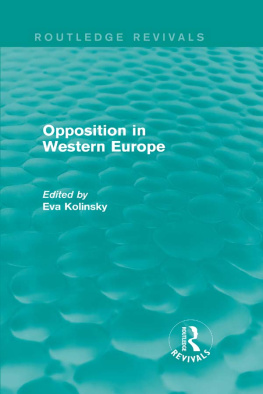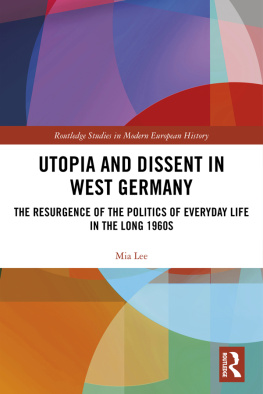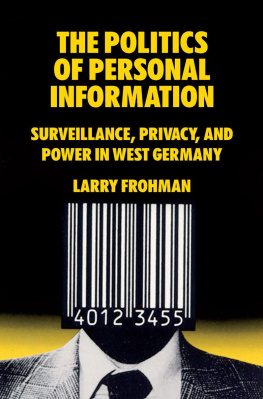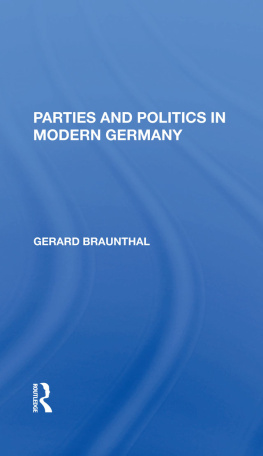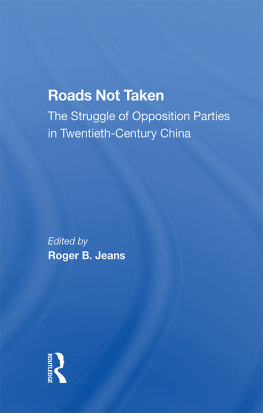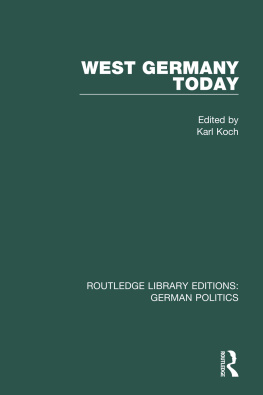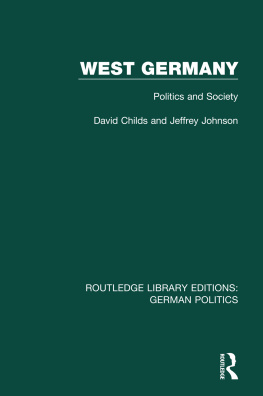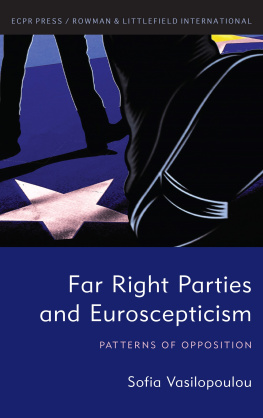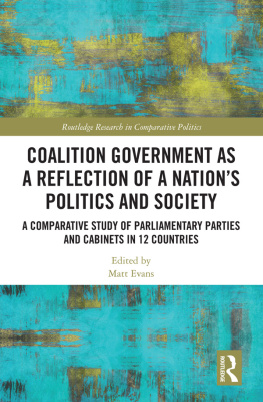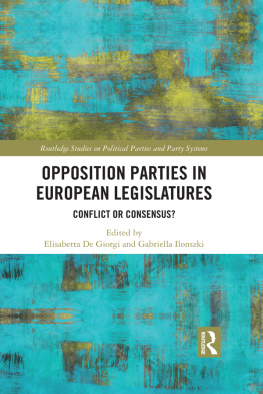First published in 1984
This edition first published in 2015
by Routledge
2 Park Square, Milton Park, Abingdon, Oxon, OX14 4RN
and by Routledge
711 Third Avenue, New York, NY 10017
Routledge is an imprint of the Taylor & Francis Group, an informa business
1984 E. Kolinsky
All rights reserved. No part of this book may be reprinted or reproduced or utilised in any form or by any electronic, mechanical, or other means, now known or hereafter invented, including photocopying and recording, or in any information storage or retrieval system, without permission in writing from the publishers.
Trademark notice: Product or corporate names may be trademarks or registered trademarks, and are used only for identification and explanation without intent to infringe.
British Library Cataloguing in Publication Data
A catalogue record for this book is available from the British Library
ISBN: 978-1-138-83837-6 (Set)
eISBN: 978-1-315-72630-4 (Set)
ISBN: 978-1-138-84651-7 (Volume 10)
eISBN: 978-1-315-72743-1 (Volume 10)
Publishers Note
The publisher has gone to great lengths to ensure the quality of this reprint but points out that some imperfections in the original copies may be apparent.
Disclaimer
The publisher has made every effort to trace copyright holders and would welcome correspondence from those they have been unable to trace.
Preface to the Re-issue
PROFESSOR EVA KOLINSKY
29 June 1940 8 August 2005
Eva Kolinsky was an outstanding scholar who was involved in a great variety of research, as well as contributing to the growth of German studies in the UK.
Her doctoral thesis, awarded magna cum laude at the Free University of Berlin, concerned German expressionism in the first decades of the twentieth century. It set the tone of her later work in its interdisciplinary approach which sought to place the subject matter in its social and cultural context. Over the course of thirty-five years, she wrote and edited 17 books as well as producing numerous articles and other publications. She was also busy raising a family.
She came to England in 1967 with the award of a Volkswagen Foundation scholarship to the University of Birmingham. She continued her career at the University of Aston in Birmingham, and then briefly at the University of Bath before being appointed to a chair at the University of Keele in 1990. She retired in 1999, and became a very active Professorial Fellow at the University of Wolverhampton.
Her creativity and energy were apparent not only in the Departments she led, but also in the very wide range of professional groups in which she was active. In the post-German unity situation she helped bring together those who had studied the German Democratic Republic with the majority of the others who had concentrated on the Federal Republic. She edited and coedited six volumes in this area, starting with a study of the city of Leipzig (published in 1995) and ending with an overview of the transition process in United and Divided Germany Since 1990 (published in 2004). She was also one of the founding editors of the journal German Politics, as well as editing two book series (Modern German Studies, and German Culture and Society).
The scope of her work was phenomenal. She sought to understand and explain the political, social and cultural aspects of post-1945 Germany. The outcome was notable studies of women and family life, of minorities (Turkish and Vietnamese migrants, and Jewish Holocaust survivors), of cultural perceptions, and of political activity and organisation. The latter included studies of opposition, the emergence of the Green party, and the processes of re-unification.
Her final, and seminal, book After the Holocaust: Jewish Survivors in Germany, was published in the autumn of 2004 just as she fell seriously ill with an incurable cancer. During a brief remission in the late spring of 2005, she began to plan follow-up studies, but the disease returned aggressively. It cut short a creative, wise and compassionate life.
For more details about her life, academic publications, and other writings, see: www.webmemorialforeva.co.uk
PARTIES, OPPOSITION AND SOCIETY IN WEST GERMANY
Eva Kolinsky
1984 . Kolinsky
Croom Helm Ltd, Provident House, Burrell Row,
Beckenham, Kent BR3 1AT
Croom Helm Australia Pty Ltd, First Floor, 139 King St.,
Sydney, NSW 2001, Australia
British Library Cataloguing in Publication Data
Kolinsky, Eva
Parties, opposition and society in West Germany.
1. Germany (West)Politics and government1982- 2. Germany (West)Social conditions I. Title
306.20943 JN3971.A91
ISBN 0-7099-1550-0
Printed and bound in Great Britain
by Billing & Sons Limited, Worcester.
In planning and writing this book, I was fortunate enough to receive much support, and would like to express my thanks. The University of Aston funded several research trips to West Germany between 1978 and 1983. A generous grant from the German Academic Exchange Service in 1983 was partly used to collect additional data for this study. I am most grateful for the financial assistance, and for the confidence in my work. I am also indebted to colleagues at West German universities and research institutes, in particular Dr. Richard Stss at the Zentralinstitut fr politische Wissenschaft at the Free University of Berlin, Dr. Klaus Troitzsch of the Forschungsstelle Parteiendemokratie in Koblenz, to Prof. Dr. Karl Dietrich Bracher for an invitation to the Institut fr politische Wissenschaft at the University of Bonn, and to Dr. Birgit Meyer for assisting with locating sources and making contacts. Their interest in the problems under discussion, and the exchange of ideas have helped to shape this book. A good deal of archive work has been carried out. Wherever I researched, I received tireless help, valuable advise, and was granted excellent working facilities. Particular thanks are due to Dr. Peter Munkell from the SPD archives in Bonn, to Dr. Pradier from the FDP archives, then in Bonn, to Dr. Schwarz from the archives of the Konrad Adenauer Foundation, to Herrn Schnarbach from the archives of the Zentralinstitut fr politische Wissenschaft and to their staff who assisted me so well. I would also like to thank members of staff at the various party headquarters who helped with interviews, materials and statistical data, especially Dr. Hans-Jrgen Beyer (FDP), Frau Doris Biesenbaum (SPD) Dr. Hans Esser (CDU), Dr. Andreas Hartwig (CDU) Frau Gustine Johannsen (Grne), Frau A. Niedermair (CSU), Dr. Klaus Suchanek (SPD), Herrn Eberhard Walde (Grne), Frau Helga Ziemann (SPD) and all their colleagues who did their best to make my research trips profitable and informative.
In the early stages of the research, Dr. Wolfgang Falke and Dr. Stephanie Hansen from the Social Science Research Institute of the Konrad Adenauer Foundation assisted with materials and valuable discussions. I would also like to thank colleagues and friends closer to home for their suggestions, comments and support throughout, in particular Prof. Dennis Ager, Dr. William E. Paterson, Dr. Gordon Smith and Mr. Christopher Upward. I also wish to thank Mrs. Jacqui Walker for producing the typescript at short notice. Special thanks are due to my students at the University of Aston whose eagerness to understand contemporary Germany has been an incentive to write this book.



